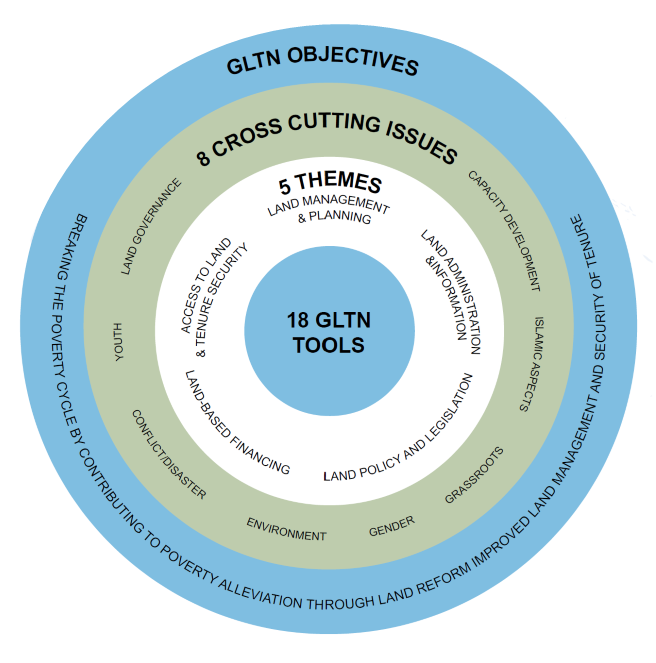
Theme 5: Land Policy and Legislation
Tool 16: Regulatory framework for private sector Tool 17: Legal allocation of the assets of a deceased person (Estates administration, HIV/AIDS areas) Tool 18: Expropriation, eviction and compensation
Tool 16: Regulatory framework for private sector
The regulatory framework for land administration, land information management, planning and building consists of laws, regulations, standards, norms, and administrative procedures relating to land development that seek to determine what developers, land-owners, communities and residents are entitled to do with and on that land. Unless specified, they should apply equally to all these groups, organisations or individuals seeking to acquire, develop or transfer urban and rural land. The regulatory framework determines also the rules, responsibilities and procedures regarding the collect and the processing of land information, and land administration.
There are a number of challenges in creating a pro poor regulatory framework such as, what should the fee structure be to the public, what should be the cost recovery policy and should there be cross subsidies to help the poor. Also, there is an ongoing debate in the world as to whether the state should supply the infrastructure as a public good to which the private sector, local government and private individuals can add value in order to address poverty alleviation, drive the economy and deliver economic and social services. In some countries the emphasis is on the private sector driving the development of the infrastructure as a business operation. In re-thinking these issues it has also been necessary to re-think the role of the public sector and the role of the private sector, as well as public-public partnerships and public-private partnerships. In undertaking this re-thinking also in regard to the land sector, it has been found that these PPPs, as they are known, are highly complex and require extensive capacity within the public sector to be properly managed. This in turn has become problematic in weak states. Finally, a key part of this PPP relationship relates to the copyright laws and the law on spatial information within a country. If the correct laws are not in place conflict can result, as well as non transparency, blocked data flows and an inability to plan and budget forwards. All of these affect the ability of countries to address security of tenure, land delivery and land management issues.
When applied to urban areas, empirical observations confirm that, in most cities, the control of urban growth by conventional planning norms and regulations is becoming less and less effective, and is tending to inhibit the implementation of initiatives designed to increase access to land.
On the one hand, established norms are often in conflict with the needs and interests of the population that live in informal settlements. The present land and building regulatory framework is not relevant to the needs of the majority. It usually serves the needs of minorities in the population, who are able to comply. On the other hand, rigid planning norms and standards and time-consuming procedures for land and housing development discourage private sector developers from investing in low- and medium-cost land or housing development projects.
The design and implementation of legal and regulatory tools to reduce homelessness, especially unrealistic legal restrictions on access to land, land use and tenure regularisation, need to be improved.
The objective is to reduce the production costs of serviced land for housing, to avoid rendering informal land and housing production processes illegal, and to reduce procedures which have discriminatory or segregationary effects.
Questions for tool developers
- What are the key issues that would have to be considered when creating a pro poor regulatory framework?
- Why is cost recovery a problem and how can this be solved?
- Should countries spend tax payers money on creating a basic land infrastructure which all people can benefit from?What would be the best methodology for reviewing land law and assessing the legislation that impacts on (i) the land development activities of the private sector, and (ii) the provision of land for low income groups?
- How do we ensure that a reduction in norms and standards for the formal private sector, especially access to land and development rights, does not impact negatively on the low income groups (encroachment of formal private market on the informal market)?
- How do we ensure a minimum set of norms or guidelines for planning standards with regard to land development, basic service provision and regularisation of informal settlements?
Tool 17: Legal allocation of the assets of a deceased person (Estates administration, HIV/AIDS areas)
Administering an estate involves dealing with all the property, investments and other assets of the person who has died and settling all their debts and then distributing the estate between the beneficiaries entitled under the deceased's Will or the Intestacy Rules. If the person who has died has left a Will; this is proved by the Executors and a Grant of Probate is obtained. If there is no Will, the deceased is said to have died "Intestate" and his or her estate is distributed in accordance with statutory rules. The state has a key role in this, and for example sometimes a court process is involved and in some countries a magistrate can make an executive decision without the court process or the involvement of professionals.
The impact of HIV/AIDS on the right to land and housing in urban areas and on rural agricultural productivity needs to be documented further. Each phase of the disease (from asymptomatic to critical illness and death) is associated with a different impact, which has different implications for land issues. The link between HIV/AIDS affected people and the distribution of assets, especially the land, property and housing, has not been adequately documented.
Clear rights to land can contribute positively to households affected by the epidemic, as this can underpin livelihoods and economic development by removing uncertainty. HIV/AIDS follows the social fault lines in a society, with marginalized groups being disproportionately vulnerable.
Gender inequality is one of the driving forces behind the spread of HIV. Men frequently have greater access to resources, including land, credit, knowledge, training and technology, than women. With the death of her husband, a woman may lose the access she had gained through him or his clan and this immediately threatens her livelihood, and that of her children.
Policies that aggravate tenure insecurity and ignore the rights and/or interests of women and children are not addressing appropriately the impact of HIV/AIDS on poor urban households.
Gender issues, including the social status and vulnerability of women, their inheritance rights and access to resources, need to be specifically addressed.
Questions for tool developers
- What methodology and tools should be used as a basis for an assessment of pro-poor land administration in the context of HIV/AIDS?
- What policies, tools and procedures are best adapted to protect the rights to land, property and housing of those affected by HIV/AIDS , especially widows and orphans?
- What are the most appropriate procedures for administrating an estate, also in the case of intestacy, and which institutions should be involved?
- How can the systems be made more pro poor and accessible?
Tool 18: Expropriation, eviction and compensation
Current dynamics accompanying the liberalisation of land markets in many developing countries, and nationwide land titling programmes carried out in the name of economic development and poverty reduction, and infrastructure for development such as dams, are increasing market pressure on low-income settlements. Many of the evictions that result from these dynamics are not recorded as such, either because they do not require the use of force, or because some form of compensation is paid to the displaced households, regardless of how fair and equitable this compensation may be.
In the case of formal settlement, expropriated owners are entitled to receive compensation corresponding to the market value of their property. Occupants in customary areas or informal settlements are in a different situation: their irregular situation regarding planning, development and/or construction norms, and their tenure status, including the use of natural resourcesmeans that they are not entitled to claim compensation. Yet this has a direct impact on their livelihoods.
In some cases, the terms of the negotiations between communities living in customary areas and informal settlements, and public authorities and landowners or developers can be considered as being fair.
In many cases, however, the households concerned are not paid compensation corresponding to the replacement cost of the dwelling unit in case of eviction or expropriation or the replacement cost of their land and the natural resources they require to maintain their livelihoods.
There is a need for a better understanding of the mechanisms and processes involved in market-driven and development driven displacements or evictions and the development of pro poor approaches.
Questions for tool developers
- What are the mechanisms involved in market-driven eviction processes?
- How can we evaluate the amount of compensation awarded in the case of informal settlements and customary tenures, where occupants are, by definition, "evicted" and not "expropriated" ?
- What does "fair" compensation mean? Does it correspond to the replacement cost of the dwelling unit in a location that has similar advantages? To the land plus the natural resources under use on that piece of land and beyond that piece of land?
Land Policy and Legislation: Related Publications
- Forced Evictions - Towards Solutions? Second Report of the Advisory Group on Forced Evictions to the Executive Director of UN-Habitat (Eng - 2007)
- Working Paper I - Evictions, Acquisition, Expropriation and Compensation: Practices and selected case studies (Eng - 2013)
- Guide to Land Mediation: Based on the experience in the eastern Democratic Republic of the Congo (Eng - 2013)
- Guide de mediation fonciere: Base sur l'Experience de l'Est de la Republique Democratique du Congo (Fr - 2013)
- How to Develop a Pro-poor Land Policy: Process, Guide and Lessons (Eng - 2007)
- How to Establish an Effective Land Sector (Eng - 2008)
- Institutional Harmonisation Processes in the Kenyan Land Sector: A Case Study of the Time Period 2003-2007 (Eng - 2008)


